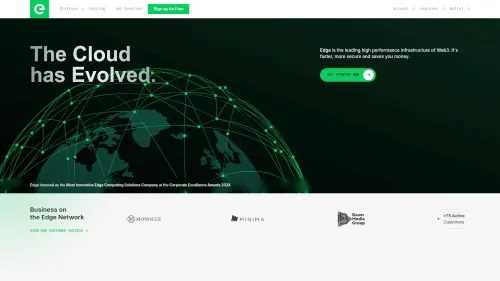Edge (EDGE)
Edge is a cryptocurrency designed to support the infrastructure of Web3 through a peer-to-peer network that offers high-performance decentralized web services. It leverages the spare computing capacity available across various devices to create a more efficient and distributed computing paradigm. This approach not only helps in reducing latency and transmission costs but also minimizes the need for centralized data centers.
The edge network
The concept of edge computing

| Ticker | EDGE |
| Category | Business Services |
| Website | https://edge.network |
| @edgenetwork | |
| Telegram | edgenetwork |
| https://www.reddit.com/r/edgenetwork | |
| Contract Addresses | |
|---|---|
| ethereum | 0x4e...31 Copied! Copied! |
Edge computing is a distributed computing model that aims to bring data storage and computation closer to the locations where they are needed. This model addresses the inefficiencies associated with traditional centralized data centers by minimizing the distance data must travel. As a result, edge computing reduces data movement volumes, network traffic, and latency, leading to a more efficient data handling process. The Edge Network operates on this principle, utilizing spare capacity from various devices to deliver decentralized web services.
Structure and operation
The Edge Network functions as a decentralized platform that provides web services by tapping into the unused computing resources available across numerous devices. This peer-to-peer network decentralizes the handling of applications, data, and computing power. By doing so, it enhances performance and reduces the reliance on centralized data infrastructures. The network is maintained by Edge Network Technologies, a not-for-profit company based in England.
The $EDGE and $XE tokens
Role and functionality
The $EDGE token serves as a bridge for transferring value within the Edge Network. It operates on a 1:1 basis with $XE, the internal coin used for various functions within the network. This includes device staking, which is the process of securing the network by holding a certain amount of tokens, and community governance, allowing stakeholders to participate in decision-making processes affecting the network.
Bridging and governance
The ability to bridge $EDGE in and out of the network seamlessly ensures fluidity and flexibility in its usage. This token bridging facilitates interactions within the Edge Network while maintaining a stable value representation between $EDGE and $XE. Community governance empowers users to influence network developments and policies, fostering a collaborative ecosystem.
Applications and benefits of Edge
Decentralized web services
Edge offers a suite of decentralized web services that capitalize on the distributed nature of its network. By leveraging available spare capacity, the network delivers efficient and high-performance services. This decentralization leads to improved service delivery with potentially lower costs and enhanced security, as data processing and storage occur closer to the end-user.
Efficiency and cost effectiveness
One of the primary advantages of the Edge Network is its ability to reduce latency and transmission costs. By minimizing the distance data needs to travel, the network enhances the speed and responsiveness of web services. This efficiency is further complemented by cost savings derived from utilizing spare capacity instead of investing in expensive centralized infrastructure.
